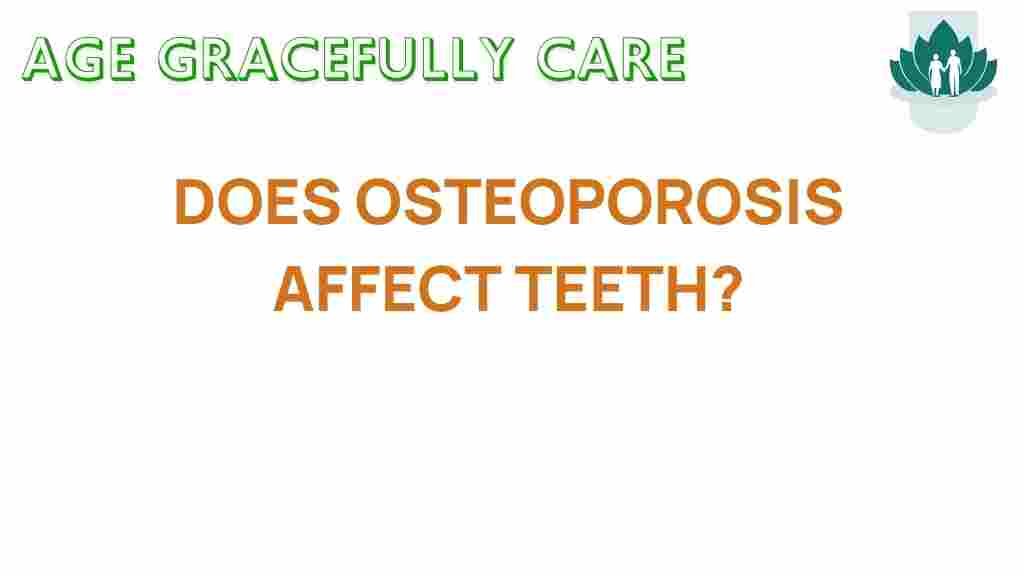Unveiling the Hidden Connection: Does Osteoporosis Affect Teeth?
Osteoporosis is often discussed in the context of bone health, primarily affecting the spine, hips, and wrists. However, its implications extend beyond these areas, particularly impacting dental health and the condition of our teeth. This article delves into the intricate relationship between osteoporosis and oral care, exploring how decreased bone density can influence dental health, the associated risk factors, and strategies for prevention.
Understanding Osteoporosis and Its Impact on Bone Density
Osteoporosis is a disease characterized by low bone density and deterioration of bone tissue, leading to an increased risk of fractures. It is often referred to as a “silent disease” because it progresses without symptoms until a fracture occurs. As we age, particularly post-menopause for women, the risk of developing osteoporosis increases significantly.
Bone density is crucial not only for skeletal health but also for the health of our teeth. The jawbone, which supports our teeth, can be affected by the same factors that lead to osteoporosis. When bone density decreases, the structural integrity of the jawbone may weaken, potentially leading to dental issues.
The Connection Between Osteoporosis and Dental Health
The connection between osteoporosis and dental health is multi-faceted. Here are some key points to consider:
- Jawbone Health: Osteoporosis can lead to a reduction in jawbone density, which affects the support for teeth. This can lead to tooth mobility and loss.
- Periodontal Disease: Individuals with osteoporosis may be at a higher risk for periodontal disease, a serious gum infection that damages the soft tissue and destroys the bone that supports your teeth.
- Tooth Loss: The weakening of jawbone can result in increased tooth loss, which can further complicate oral health and overall well-being.
Risk Factors Contributing to Osteoporosis and Dental Health Issues
Several risk factors contribute to both osteoporosis and compromised dental health. Understanding these factors can help in prevention and management:
- Aging: As we age, bone density naturally decreases, making osteoporosis more likely.
- Gender: Women are at a higher risk, especially post-menopause due to hormonal changes.
- Family History: Genetics play a significant role in bone density and risk of osteoporosis.
- Dietary Factors: A diet low in calcium and vitamin D can contribute to lower bone density.
- Smoking and Alcohol Consumption: Both can interfere with the body’s ability to absorb calcium and maintain bone density.
- Medications: Certain medications, particularly corticosteroids, can contribute to bone loss.
How Osteoporosis Affects Teeth: The Process Explained
To understand how osteoporosis affects teeth, it’s essential to look at the process:
- Bone Density Loss: Osteoporosis leads to a decrease in bone density, affecting the jawbone that supports teeth.
- Jawbone Resorption: As the jawbone loses density, it can undergo resorption, where the body reabsorbs bone tissue, further weakening the support for teeth.
- Increased Mobility: Teeth may become loose due to the lack of adequate support, leading to potential tooth loss.
- Compromised Oral Health: Weakened teeth and jawbone can increase the risk of gum disease, complicating overall oral care.
Preventing Osteoporosis and Protecting Dental Health
Prevention is key when it comes to osteoporosis and its impact on dental health. Here are some effective strategies:
- Maintain a Balanced Diet: Ensure adequate intake of calcium and vitamin D through foods such as dairy products, leafy greens, and fortified foods.
- Regular Exercise: Weight-bearing exercises can help improve bone density and overall health.
- Avoid Tobacco and Limit Alcohol: Quitting smoking and moderating alcohol consumption can significantly reduce your risk of osteoporosis.
- Regular Dental Checkups: Visiting your dentist regularly can help identify potential issues early and maintain optimal dental health.
- Discuss Medications with Your Doctor: If you are on long-term medication, such as corticosteroids, consult your healthcare provider about bone health.
For more detailed guidelines on maintaining oral health, you can check this resource.
Oral Care Tips for Those with Osteoporosis
Proper oral care is essential for individuals with osteoporosis. Here are some tips to maintain healthy teeth and gums:
- Brush and Floss Regularly: Maintain a consistent routine of brushing twice a day and flossing daily to prevent gum disease.
- Use Fluoride Toothpaste: Fluoride can help strengthen teeth and protect against decay.
- Stay Hydrated: Dry mouth can be a side effect of some medications; staying hydrated helps keep the mouth moist.
- Use an Antimicrobial Mouthwash: This can help reduce plaque buildup and fight gum disease.
- Consider Dental Supplements: Talk to your dentist about options such as calcium supplements if dietary intake is insufficient.
Troubleshooting Common Dental Issues Related to Osteoporosis
Individuals with osteoporosis may face specific dental issues. Here are some common problems and how to address them:
- Loose Teeth: If you notice any mobility in your teeth, consult your dentist immediately. They may recommend treatments to stabilize the teeth.
- Gum Recession: Monitor your gums and seek professional cleaning or treatment if you experience recession or inflammation.
- Tooth Sensitivity: Use toothpaste designed for sensitive teeth and discuss other treatment options with your dentist.
Conclusion
The relationship between osteoporosis and dental health is a critical area of concern, especially for aging populations. Understanding that osteoporosis can affect teeth through decreased bone density and weakened jaw structure is essential for proactive oral care. By recognizing risk factors and implementing preventive measures, individuals can protect not only their bone health but also their dental health.
Regular dental visits, maintaining a balanced diet, and following proper oral care routines are vital steps in ensuring healthy teeth and gums. If you have concerns about osteoporosis and its effects on your dental health, consult with both your healthcare provider and dentist for tailored advice and treatment options.
For more information on osteoporosis and its management, visit the National Osteoporosis Foundation.
This article is in the category Health and created by AgeGracefullyCare Team

1 thought on “Unveiling the Hidden Connection: Does Osteoporosis Affect Teeth?”